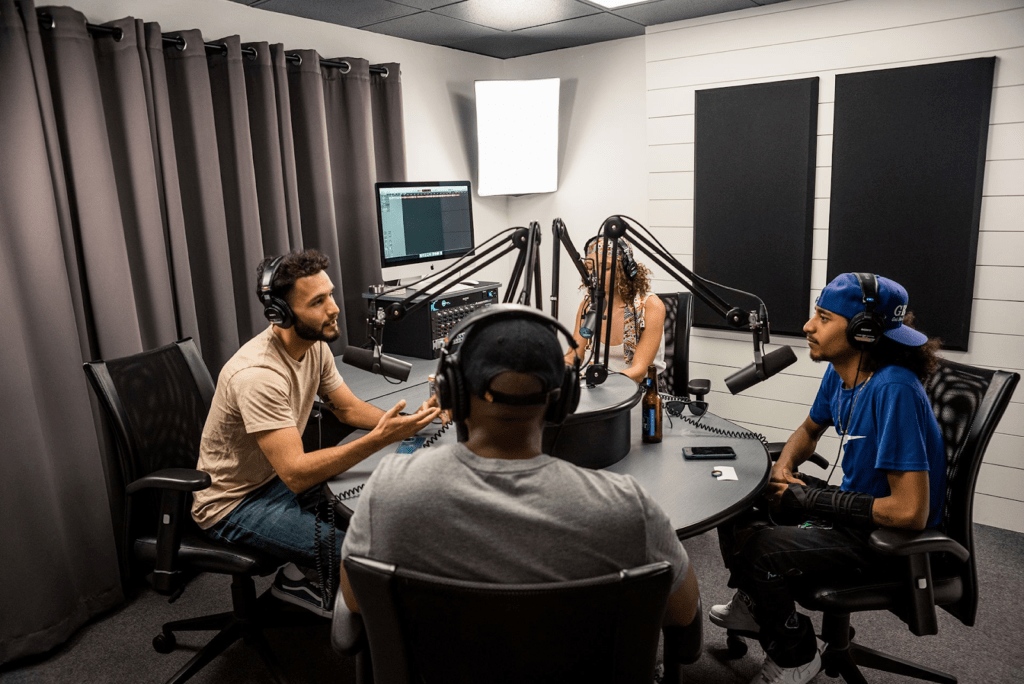
1. Establish the Name, Purpose, Audience

So you’ve got something to say about our crazy world?
After marshaling down the general theme of your podcast idea, you’ll need to include its purpose. Establishing a purpose will act as your North Star when you are trying to choose the topic for subsequent episodes. Making the purpose specific yet open is key. For example, if you’re passionate about the thematic elements of film and how they apply to daily life, your purpose could go in countless directions.
For example:
- I want to illuminate the most obscure pieces of film in order to broaden my audience’s understanding of the art, while making tangible connections to current events, effectively proving each movie’s relevance.
- I want to focus chiefly on pieces of historical fiction, interviewing people who were involved in some capacity in order to determine the accuracy of the Hollywood portrayals.
Now it’s relatively safe to assume that children 13 and under are not going to be your target audience for either one of these potential podcasts. So who is? This may be one of the more important steps of the materialization process since it will also determine who your sponsors will be (they only want to advertise to possible buyers) and what your topics will be (adapting to fan feedback will be crucial for long-term success).
2. Determine Podcast Structure

Think about how your content will be experienced by your listeners.
Will you have interviews with special guests anchoring every episode or discussions based on external sources that you have reviewed prior to recording? As you narrow down your choices, make sure you understand the time commitments of each approach. You will need to book guests far into the future to ensure a frequent publishing schedule, in addition to reviewing their expertise. Weighing the pros and cons in the early stages will ensure the stable longevity of your creative project.
There are countless ways to structure your recording time, so get creative and stand out!
3. Schedule Studio Time for Audio Recording

In order to achieve the highest quality of sound production, which is key to drawing in initial listeners, you’ll need to find a reliable studio. Having immediate access to a vast arsenal of recording equipment, as well as the advice and guidance of seasoned professionals, will give you an essential edge.

Demŭn Studios (Website Link Here and featured in the above photo) has specialized in podcasts for over five years. These folks are conditioned professionals who can provide everything needed to produce high-quality recording. Everything from equipment set-up and recording to audio editing and digital distribution will be in the hands of experts. What’s even better about this place is that the engineers who work here care deeply about their craft. Ask questions, build a community, and create something that audiences will want to return to again and again.
4. Getting Sponsors

Think of the last podcast you listened to. What were their sponsors? Did the content of the advertisements apply to you? Once your podcast starts to grow in its following, you’ll be able to accrue a revenue stream via reaching out to companies who find your audience numbers appealing. While established creators like Joe Rogan (The Joe Rogan Experience) and Terry Gross (NPR’s Fresh Air) do not need to proactively contact possible advertisers, all beginners need to keep it top of mind.
Consider the following:
- What is the age demographic of my podcast content?
- Which companies would benefit from an advertising space on our show?
- What is our value add?
When you approach your podcast project with all this information fleshed out, it will be a much smoother transition from a hobby to a full-time lifestyle.
5. Publish Your First Episode! (Choose a Host & Cover Art)

Until your podcast picks up a steady following from social media promotion, advertising, or word of mouth, you will need to catch people’s attention in every way possible. There are hundreds of options out there for listeners to choose from, so establishing a unique cover art design to draw one’s attention while they scroll through the digital sea is a must. Do not underestimate the power of visual intrigue simply because you believe your content speaks for itself.
Do some initial field research by having a neutral friend scroll through podcasts and ask why they chose those particular ones. What are their favorite podcasts? What causes them to click on one thing more than another? The more people you survey, the more your findings will be representative of the average potential subscriber.
Now the time has come to get that shiny new beauty out into the devices of people everywhere! While Disktroid is the best choice for uploading any musical endeavors, podcasts operate on a slightly different platform of distribution. You can eliminate all the potential stress of researching and choosing a distribution software if you choose to work with Demŭn Studios, however. They can walk you through the entire process!
If you choose the independent route, here are the top two options to consider when you are ready to publish:
Paragraph
There you have it! Before popping that expensive champagne in celebration of your first-ever official podcast though, make sure to map out the next few months of shows in terms of frequency, topic, interview guest (if applicable), and time dedication needed for preparation. You got this!

###
